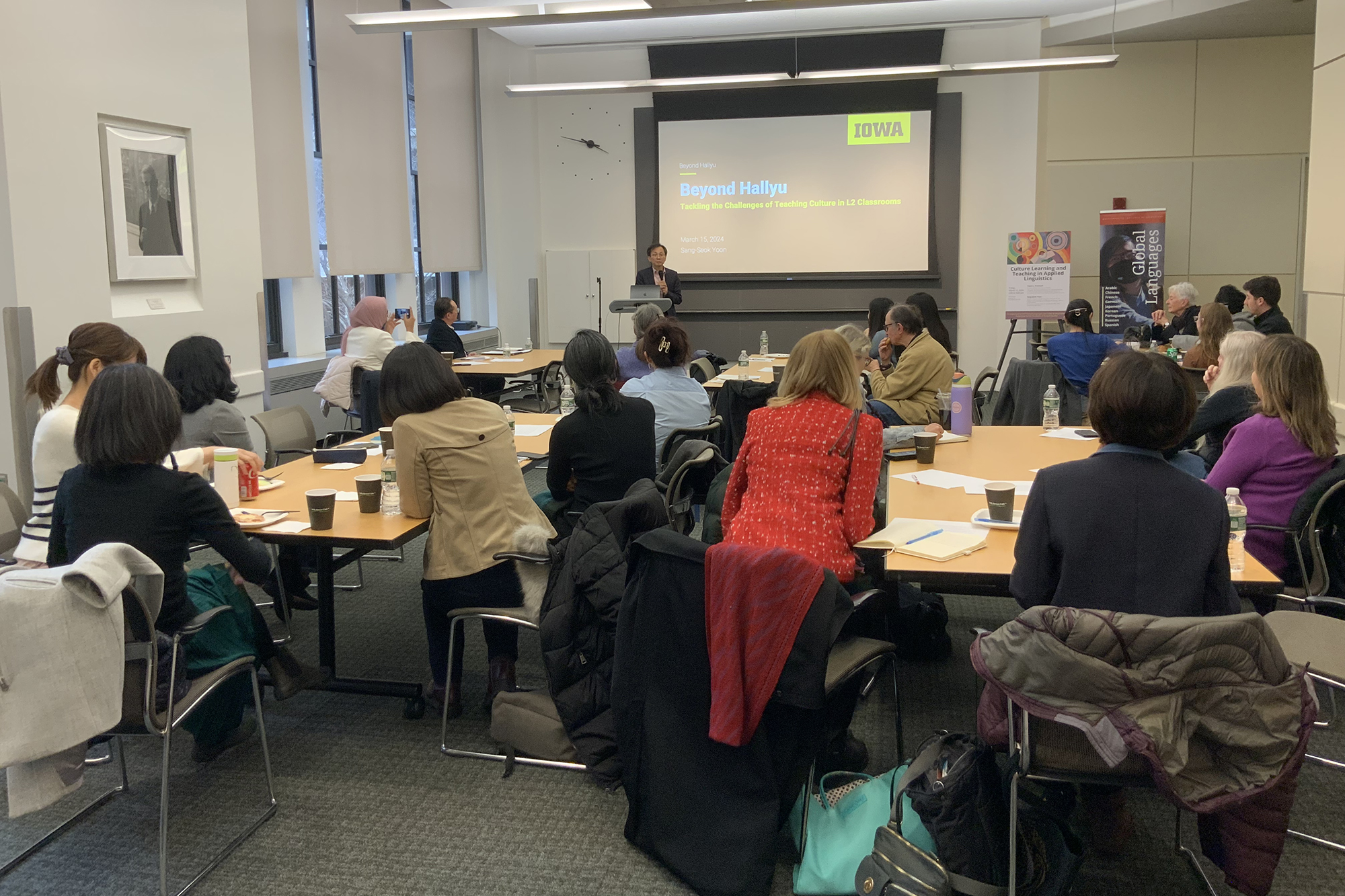
“How can you teach language without teaching what the language indexes—namely the culture?” That question, posted by Claire Kramsch kicked off a workshop at MIT attended mainly by area language educators. The Culture Learning and Teaching in Applied Linguistics workshop held March 15 featured talks by two distinguished figures in the field of second language education, Claire Kramsch and Sang-Seok Yoon.
Claire Kramsch’s talk “Qui parle? Reconceptualizing culture in a globalized world” outlined the study of discourse in multilingual and multicultural speech environments, weaving anecdotes from her teaching career between analyses of symbolic power and violence in the language of a French fable, meaning making in autobiographical sketches of multilingual scholars, and the tension between conservative Korean monoculture and the realities of translanguaging in Korean cultural exports and the Korean diaspora. “Qui parle?” – literally “who is speaking?” – was Kramsch’s repeated question, signaling the value of speakers’ personal and cultural discourses as they understand, and are understood by, others. In understanding cultural differences between individuals and inviting this discussion in the second language classroom, educators can address language use that machine and AI translation largely ignore: the tourist gaze in learning colonial languages; the symbolic power difference in language choice; and words and concepts that are linguistically or culturally untranslatable.
Kramsch has long been a pivotal scholar in applied linguistics. Her decades of experience in language instruction include an influential era at MIT, where in 1985 she co-founded the Athena Language Learning Project, creating the first interactive multimedia resources for culturally authentic language learning. Since 1990, she was a faculty member at UC Berkeley and was the founding director of the Berkeley Languages Center. Kramsch is a Professor Emerita in the University of California, Berkeley Department of German,
Sang-Seok Yoon’s talk “Beyond Hallyu: Tackling the Challenges of Teaching Culture in L2 Classrooms,” addressed the shifts in Korean language education throughout the Korean Wave of cultural influence, especially over the last two decades. Students studying Korean must negotiate a balance between learning the contexts of conservative monoculturalism and embracing the multilingual, global phenomena that have spread Korean language, industry, and entertainment widely. Instructors and English-speaking students face the challenges of an already-difficult language, with comparatively limited representation of gender, sexuality, and racial diversity, while encountering language-learning materials that too often otherize or exceptionalize Korean culture. Yoon invites educators and students to address these challenges directly in the classroom, and to step away from inflexible resources to explore and celebrate the use of Korean language in popular culture both for Korean and international audiences. The field faces the additional challenge of understanding situational language use for Korean learners, including the use of honorifics, simulating differences in social roles and identities, and practicing strategies for different speech acts (e.g., requests, apologies, complaints, refusals) in these contexts.
Yoon, who is an Assistant Professor and Coordinator of the Korean Program at the University of Iowa, is an expert in sociolinguistics and co-author of Integrated Korean, the most popular Korean language textbook series in the United States. His YouTube channel, @ProfYoonsKoreanLanguageClass, has over 800 freely available Korean language lessons for beginner and intermediate students, with more than 167,000 subscribers and over ten million views.
Dozens of attendees, including many former MIT colleagues of Kramsch, remained for a Q&A session with the presenters. The event was co-organized by MIT Global Languages and SUNY at Binghamton, supported by the Academy of Korean Studies. Hee-Jeong Jeong, MIT Senior Lecturer in Korean, welcomed attendees to the event. Per Urlaub, Director of MIT Global Languages, and Sungdai Cho, Director of the Center for Korean Studies at University of New York (SUNY) Binghamton, also delivered introductory remarks.
Asked about the results of the workshop, Hee-Jeong Jeong commented: “The workshop highlighted how culture is key in teaching languages, mixing ideas with real classroom use and building a special community of language teachers. Big thanks to our speakers and everyone who came, which made our teaching methods better and our approach more complete. It was a great opportunity to share new ideas and build stronger ties between different languages and schools, showing how working together can really improve language education for everyone.”
